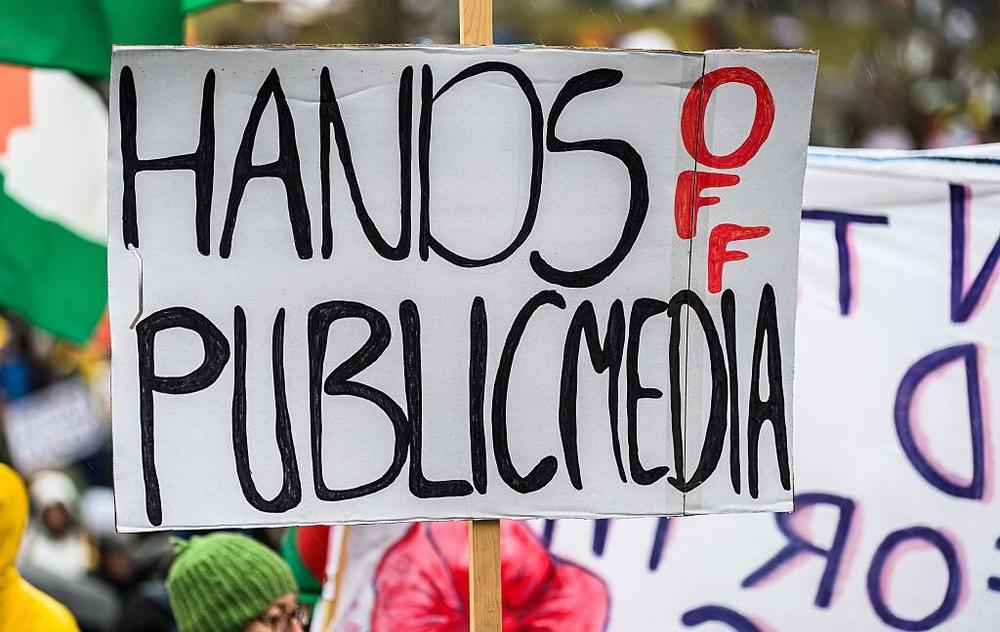Despite the protests of millions of Americans, the Corporation for Public Broadcasting (CPB) announced it will be winding down its operations after the White House deemed NPR and PBS a "grift" and pushed for a Senate vote that eliminated its entire budget.
The vote rescinded $1.1 billion that Congress had allocated to CPB to fund public broadcasting for fiscal years 2026 and 2027. In a press release, CPB explained that the cuts "excluded funding for CPB for the first time in more than five decades." CPB president and CEO Patricia Harrison said the corporation had no choice but to prepare to shut down.
"Despite the extraordinary efforts of millions of Americans who called, wrote, and petitioned Congress to preserve federal funding for CPB, we now face the difficult reality of closing our operations," Harrison said.
Concerned Americans also rushed to donate to NPR and PBS stations to confront the funding cuts, The New York Times reported. But those donations, estimated at around $20 million, ultimately amounted to too little, too late to cover the funding that CPB lost.
As CPB takes steps to close, it expects that "the majority of staff positions will conclude with the close of the fiscal year on September 30, 2025." After that, a "small transition team" will "ensure a responsible and orderly closeout of operations" by January 2026. That team "will focus on compliance, final distributions, and resolution of long-term financial obligations, including ensuring continuity for music rights and royalties that remain essential to the public media system."
"CPB remains committed to fulfilling its fiduciary responsibilities and supporting our partners through this transition with transparency and care," Harrison said.
NPR mourns loss of CPB
In a statement, NPR's president and CEO, Katherine Maher, mourned the loss of CPB, warning that it was a "vital source of funding for local stations, a champion of educational and cultural programming, and a bulwark for independent journalism."
The agency's shuttering won't just impact public media during Trump's term, Maher suggested, but will cause "ripple effects" across "every public media organization and, more importantly, in every community across the country that relies on public broadcasting."
"We're grateful to CPB staff for their many years of service to public media," Maher said.
Trump's attacks on CPB also included suing CPB directors who refused to be fired and are part of a broader campaign to eliminate what he views as anti-conservative bias in media. Most recently, Trump's Federal Communications Commission appointed a bias monitor to babysit CBS's programming. Critics fear that could make it easier for Trump to censor CBS News and "silence dissidence." These fights to control the news come at a time when access to local news is shrinking and having an "insidious effect on" democracy, the American Journalism Project has warned.
Vowing to help support local stations to fill the gap and keep the public informed, Maher noted that the closure of CPB also "represents the loss of a major institution and decades of knowledge and expertise" that has guided how the US fosters media as a public service for 60 years.
"As an independent, nonprofit news organization, NPR remains resolute in our pursuit of our mission: to create an informed and inspired public in partnership with our Member stations," Maher said. "We will continue to respond to this crisis by stepping up to support locally owned, nonprofit public radio stations and local journalism across the country, working to maintain public media's promise of universal service, and upholding the highest standards for independent journalism and cultural programming in service of our nation."
Harrison thanked partners for helping to keep CPB's mission alive.
"Public media has been one of the most trusted institutions in American life, providing educational opportunity, emergency alerts, civil discourse, and cultural connection to every corner of the country,” Harrison said. “We are deeply grateful to our partners across the system for their resilience, leadership, and unwavering dedication to serving the American people."

 Bioshock 4 is reportedly stuck in development hell with huge setbacks
Bioshock 4 is reportedly stuck in development hell with huge setbacks